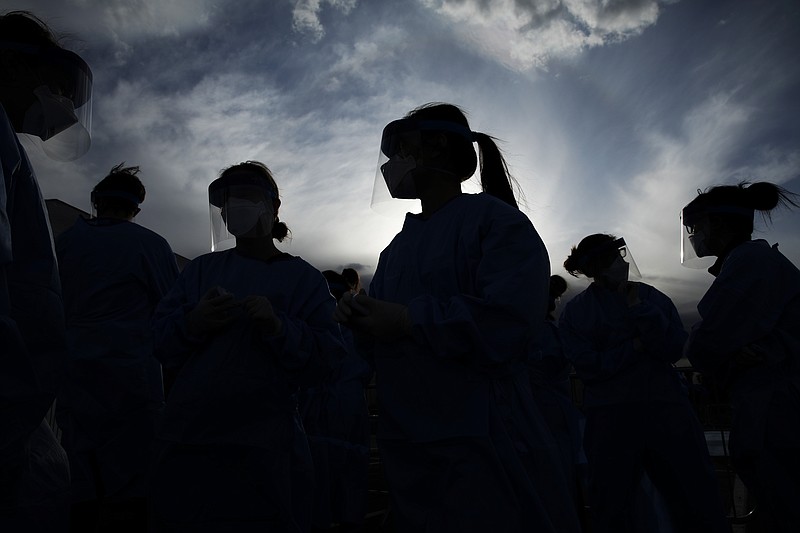With more than 200,000 people in the U.S. who have died from covid-19, the milestone hit Tuesday is equivalent to a 9/11 attack every day for 67 days. It is roughly equal to the population of Salt Lake City or Huntsville, Ala.
[CORONAVIRUS: Click here for our complete coverage » arkansasonline.com/coronavirus]
And it is still climbing. Deaths are running at close to 770 a day on average, and a widely cited model from the University of Washington predicts the U.S. toll will double to 400,000 by the end of the year as schools and colleges reopen and cold weather sets in. A vaccine is unlikely to become widely available until 2021.
"The idea of 200,000 deaths is really very sobering, in some respects stunning," Dr. Anthony Fauci, the government's top infectious-disease expert, said on CNN.
[Video not showing up above? Click here to view » https://www.youtube.com/watch?v=3lsLbvAYNAk]
"It is completely unfathomable that we've reached this point," said Jennifer Nuzzo, a Johns Hopkins University public-health researcher, eight months after the scourge first reached the world's richest nation, with its state-of-the-art laboratories, top-flight scientists and stockpiles of medical supplies.
The milestone was reported by Johns Hopkins, based on figures supplied by state health authorities.
Trump said it was "a shame" the U.S. reached that number but argued the toll could have been much worse.
"I think if we didn't do it properly and do it right, you'd have 2.5 million deaths," President Donald Trump told reporters at the White House before leaving Tuesday for a campaign rally in Pittsburgh. He added that the United States is now "doing well" and "the stock market is up."
On Twitter, Democratic presidential candidate Joe Biden said, "It didn't have to be this bad."
"It's a staggering number that's hard to wrap your head around," he said. "There's a devastating human toll to this pandemic -- and we can't forget that."
For five months, America has led the world in sheer numbers of confirmed infections -- nearly 6.9 million as of Tuesday -- and deaths. The U.S. has less than 5% of the globe's population but more than 20% of the reported deaths.
Brazil is No. 2 with about 137,000 deaths, followed by India with approximately 89,000 and Mexico with around 73,600. Only five countries -- Peru, Bolivia, Chile, Spain and Brazil -- rank higher in covid-19 deaths per capita.
Black and Hispanic people and American Indians have accounted for a disproportionate share of the deaths, underscoring the economic and health care disparities in the U.S.
Worldwide, the virus has infected more than 31 million people and is closing in on 1 million deaths, with just over 967,000 lives lost, by Johns Hopkins' count, though the real numbers are believed to be higher because of gaps in testing and reporting.
For the U.S., it wasn't supposed to go this way.
When the year began, the U.S. had recently garnered recognition for its readiness for a pandemic. Health officials seemed confident as they converged on Seattle in January to deal with the country's first known case of the coronavirus, in a 35-year-old Washington state resident who had returned from visiting his family in Wuhan, China.
On Feb. 26, Trump held up pages from the Global Health Security Index, a measure of readiness for health crises, and declared, "The United States is rated No. 1 most prepared."
The U.S. outranked the 194 other countries in the index. Besides its labs, experts and strategic stockpiles, the U.S. could boast of its disease trackers and plans for rapidly communicating lifesaving information during a crisis. The U.S. Centers for Disease Control and Prevention was respected around the world for sending help to fight infectious diseases.
But monitoring at airports was loose. Travel bans came too late. Only later did health officials realize the virus could spread before symptoms show up, rendering screening imperfect. The virus also swept into nursing homes and exploited poor infection controls, claiming more than 78,000 lives.
"We have from the very beginning lacked a national testing strategy," Nuzzo said. "For reasons I can't truly fathom, we've refused to develop one."
[Gallery not loading above? Click here for more photos » arkansasonline.com/923memorial/]
Sandy Brown of Grand Blanc, Mich., called the death toll "gut-wrenching." Her husband of 35 years and their 20-year-old son -- Freddie Lee Brown Jr. and Freddie Lee Brown III -- died of covid-19 just days apart in March, when there were fewer than 4,000 recorded deaths in the U.S.
"The thing that really gets to me is ... if things had been done properly, we could have put a lid on this," said Brown, who has no other children. "Now it's just unbelievable. It's devastating."
Information for this article was contributed by Kelli Kennedy and Tammy Webber of The Associated Press.






